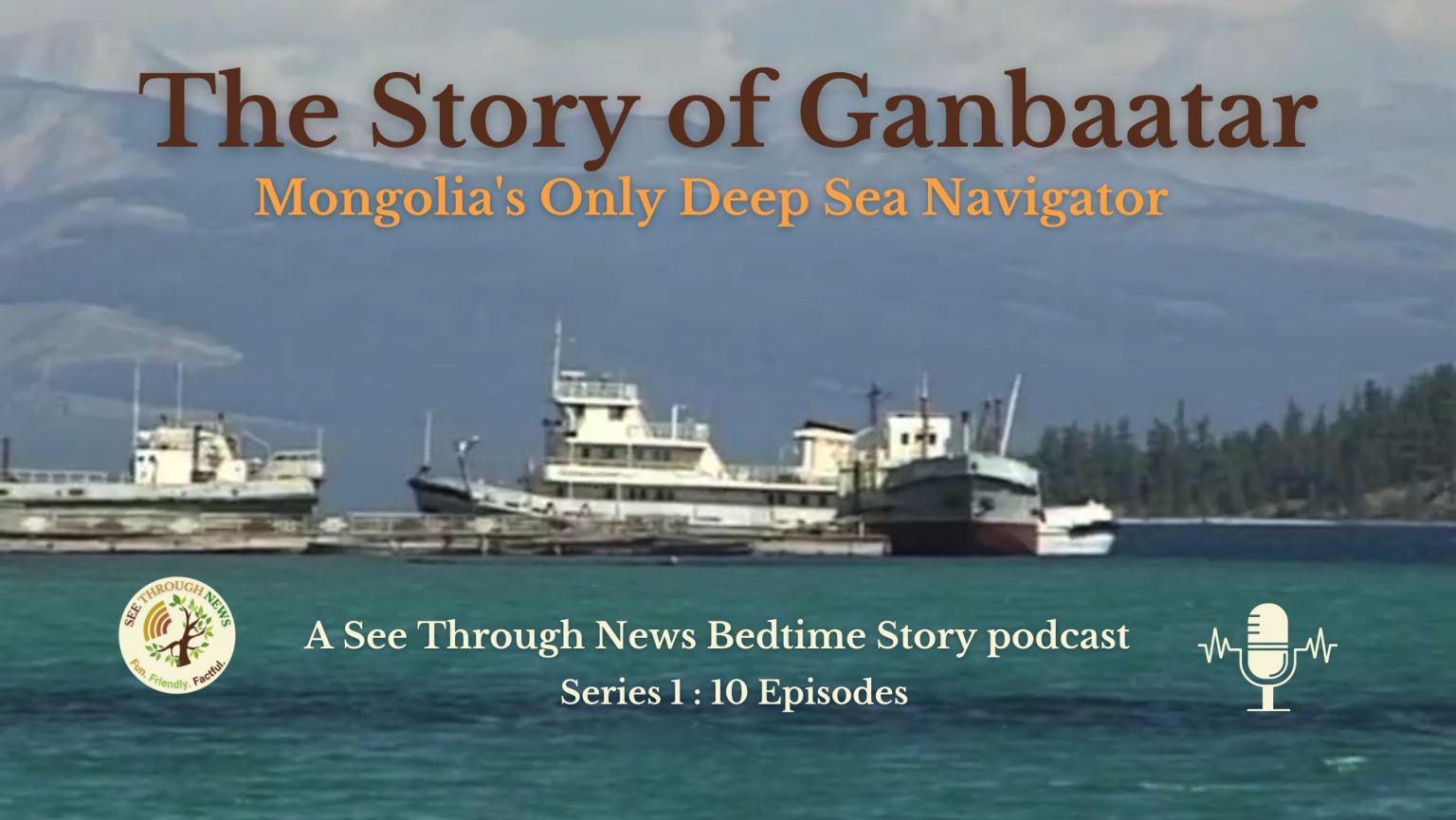Episode 2 of The Story of Ganbaatar: the only deep sea navigator in Mongolia, Series 1 of our ‘The Truth Lies in Bedtimes Stories from See Through News’ podcast
Having set the scene in Episode 1, Fact, Fiction & Mongolia, in Episode 2, A Smart Boy, a Lake and a Boat, introduces Ganbaatar, and his unlikely origins as the Only Deep Sea Navigator in Mongolia.
Music Notes: The lake shanty is as recorded by SternWriter by Lake Huvsgul in 2000. Batbayan is the lead singer.
The flute and zither music is the traditional long song ‘Khan Khokhlin Ujanga’, performed by the Mandukhai Ensemble around 1992.
Episode 1 – Fact, Fiction & Mongolia
Next: Episode 3 – The Crisis Meeting
Written, Produced and Narrated by SternWriter
Audio production by Sam Wain
The Truth Lies in Bedtime Stories is a podcast from See Through News.
See Through News is a non-profit social media network with the Goal of Speeding Up Carbon Drawdown by Helping the Inactive Become Active.
Transcript
Episode 2: A Smart Kid, a Lake and a Boat.
This story begins many years ago with a young man called Ganbaatar.
Like most Mongolians, Ganbaatar only had one name. Like most Mongolians, he only needed one name.
A few years back, Mongolia realised it could no longer rely on just one name in a world of computers and databases and identity documents. It might be obvious to neighbours from this area that you could only possibly mean this Ganbaatar, but computers weren’t so smart.
The government gave all Mongolians a one-off chance to pick their own family name, to make life easier for the computers.
It didn’t work, because they nearly all chose to call themselves Khan, after their national hero Chinghis Khan, who we know as Genghis Khan, so they had to abandon that plan.
But our Ganbaatar grew up long before anyone had heard of a computer, in a time and place where there were plenty of names to go round.
He grew up in the north of Mongolia, near the Soviet border. Unusually, as well as grassland, there were mountains, and a huge lake. The mountains were famous for their wolves, and the lake was famous for its boat.
It was the only boat in all of Mongolia. To young Ganbaatar, it was magic.
He couldn’t wait for the summer, when his family would pack their ger, muster their livestock, and move to their summer grazing area. They pitched their ger right by the lake, the other side from the mountains.
He’d heard one of them could swim, but never saw that particular miracle.
On a still day, when the grass fell quiet, he could hear the sailors sing songs about their boat. It was called the Sukhbaatar, after a communist hero known as the Father of the Mongolian Revolution.
Across the lake, young Ganbaatar caught the words from the air, and sang along with them.
We’re masters of the Sukhbaatar
We’re masters of the blue roads
We’re crossing the blue waters
Steering our mighty vessel.
For a young nomad boy, whose world was grass and hooves, the sight of this boat on the lake was as mysterious as a dragon, ghost or fairy.
Ganbaatar was a smart child. He learned to read and write. He learned Russian. He passed exams.
Local party officials spotted his talent. Official letters were sent.
Before long an official letter arrived from the far-off capital, Ulaan Baatar. It was from the Ministry of Agriculture, informing Ganbaatar he should report there for work.
Ganbaatar was the first from his clan to achieve such an honour. Family and neighbours held a big farewell party. The week before he left, his three closest friends took him on a hunting expedition in the mountains, [Q: rifle shot]
where he shot a fine wolf.
At the send-off, just before he climbed into the cab of the long-distance truck that would begin his long journey to his new life in the capital, his friends presented him with one of the wolf’s paws.
One paw each, a memento of their last days together. For his friends, the wolf paw was a way to remember their distant friend. For Ganbaatar, it was a piece of home to carry with him.
Ganbaatar placed the paw carefully on top of his spare set of clothes, and clicked shut the little leather briefcase that was all he was taking to start his new life in the capital.
His friends’ eyes blurred with tears, as they watched the truck’s dusty plume diminish, and finally disperse, leaving no trace of its passage on the horizon.
By then Ganbaatar’s eyes were clear, fixed on the road ahead.
Tease: In Part 3: The Crisis Meeting, we’ll discover the origins of Ganbaatar’s strange story, and what set him on a journey way longer than his trip to the capital city.
In case you thought this whole story was made up, this is the lake shanty we use for this podcast’s theme music.
Unless you think we’re making that all up too.
We’d understand if you did, and wouldn’t take it personally – in fact, we know how you feel.
As we’ve warned, fact and fiction are hard to separate in Mongolia in general, and this story in particular.
For example, it’s asking a lot of you to believe that the Only Boat in Mongolia is a tug.
Before Ganbaatar’s father was born, it had been hauled, piece by piece, across the mountains on horseback to the lake, where it was assembled by Soviet engineers.
One day, the lake had a boat on it, and so it has been every day since.

